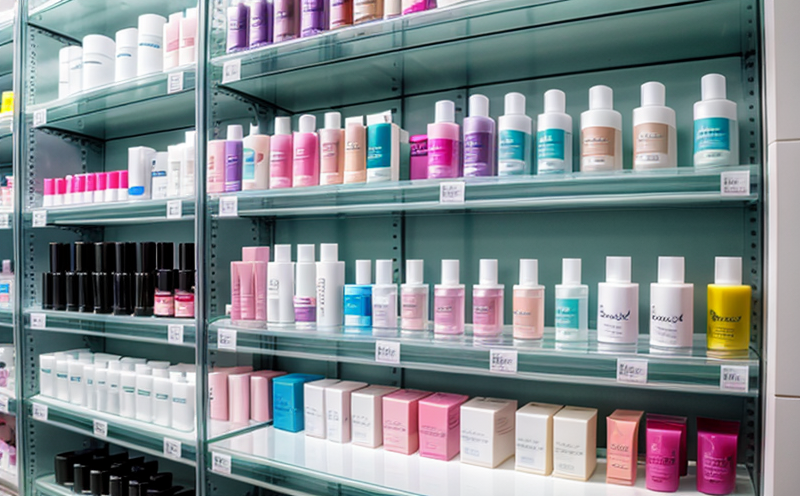Moisturizing Agent Stability Testing in Lotions
The stability and shelf life of moisturizing agents in lotions are critical factors that influence product quality, consumer satisfaction, and overall market success. Moisturizing agents play a pivotal role in maintaining the skin’s hydration levels, which is essential for the formulation to perform as intended over time. This service focuses on evaluating the stability of these key ingredients through rigorous testing methods designed to mimic real-world conditions accurately.
Stability testing involves exposing the lotion containing moisturizing agents to various environmental stressors such as temperature, humidity, and light. By understanding how these factors affect the formulation, manufacturers can ensure that their products maintain efficacy and safety throughout their shelf life. This process is essential for compliance with regulatory standards like ISO 25018:2019, which sets guidelines for cosmetic product quality.
The testing begins by selecting appropriate samples from different batches or production runs. These samples are then subjected to controlled environmental chambers where they undergo accelerated aging under specified conditions. The chosen temperatures and humidity levels reflect worst-case scenarios that the products may encounter during storage and transportation. For instance, high humidity combined with elevated temperatures can cause degradation of certain ingredients leading to reduced effectiveness over time.
During this phase, it is important to monitor not only the physical properties but also chemical changes within the lotion formulation. Parameters such as viscosity, color change, pH levels, and microbial growth are closely watched for any signs of instability or deterioration. Additionally, instrumental analysis techniques like Fourier Transform Infrared Spectroscopy (FTIR), Nuclear Magnetic Resonance (NMR), and Differential Scanning Calorimetry (DSC) provide deeper insights into molecular interactions and phase transitions within the lotion during aging.
Once initial stability data has been gathered, further testing may involve accelerated shelf life studies using statistical models to extrapolate findings over longer periods. This helps predict when a product might start losing its intended properties based on current observations. The goal is to establish realistic expiration dates for each batch while maintaining high standards of quality assurance.
By leveraging this service, cosmetic companies can gain valuable insights into their products’ behavior under different conditions, ensuring they meet both regulatory requirements and customer expectations. This proactive approach not only enhances product performance but also fosters trust among consumers who rely on consistent results from brand offerings.
Industry Applications
The application of moisturizing agent stability testing is widespread across the cosmetic industry, particularly for those manufacturers focusing on lotions and creams. Below are some key areas where this service plays a crucial role:
- Evaluation of new ingredient formulations to ensure long-term effectiveness.
- Verification of existing product lines against changing regulatory standards.
- Determination of optimal storage conditions during manufacturing processes.
- Prediction of shelf life for different packaging configurations.
| Environmental Conditions | Description |
|---|---|
| Temperature | Ranges from 40°C to 60°C, depending on the test scenario. |
| Humidity | Conditions range between 75% and 93%, representing typical warehouse storage environments. |
| Light Exposure | Involves exposure to UV light equivalent to sunlight, simulating outdoor storage conditions. |
| Test Methods | Description |
|---|---|
| Accelerated Aging | Exposure of samples to extreme temperatures and humidity levels over short periods. |
| Statistical Modeling | Use of mathematical models to extrapolate stability data from shorter test durations. |
| Instrumental Analysis | Employing advanced analytical tools like FTIR, NMR, and DSC for detailed component analysis. |
Customer Impact and Satisfaction
Conducting thorough moisturizing agent stability testing ensures that cosmetics remain effective and safe for extended periods. This translates directly into improved customer satisfaction as users experience consistent results without unexpected side effects or reduced efficacy over time.
Manufacturers who invest in such testing can build stronger brand loyalty by delivering reliable products consistently across all markets. Moreover, adherence to stringent quality control measures demonstrates commitment to consumer health and safety, which is increasingly important given heightened awareness around personal care product quality.
Competitive Advantage and Market Impact
In today’s competitive market, ensuring the longevity of moisturizing agents in lotions can give companies a significant edge. Products that retain their intended benefits longer are more likely to gain preference over competitors’ offerings.
Achieving regulatory compliance through comprehensive stability testing not only protects brands from potential legal issues but also enhances their reputation as trustworthy providers of safe and effective cosmetics. This, in turn, opens up opportunities for growth both domestically and internationally by building a strong consumer base that values quality above all else.





